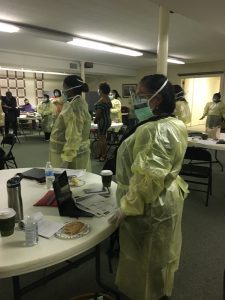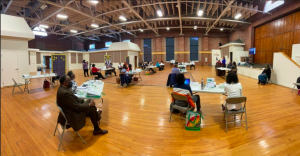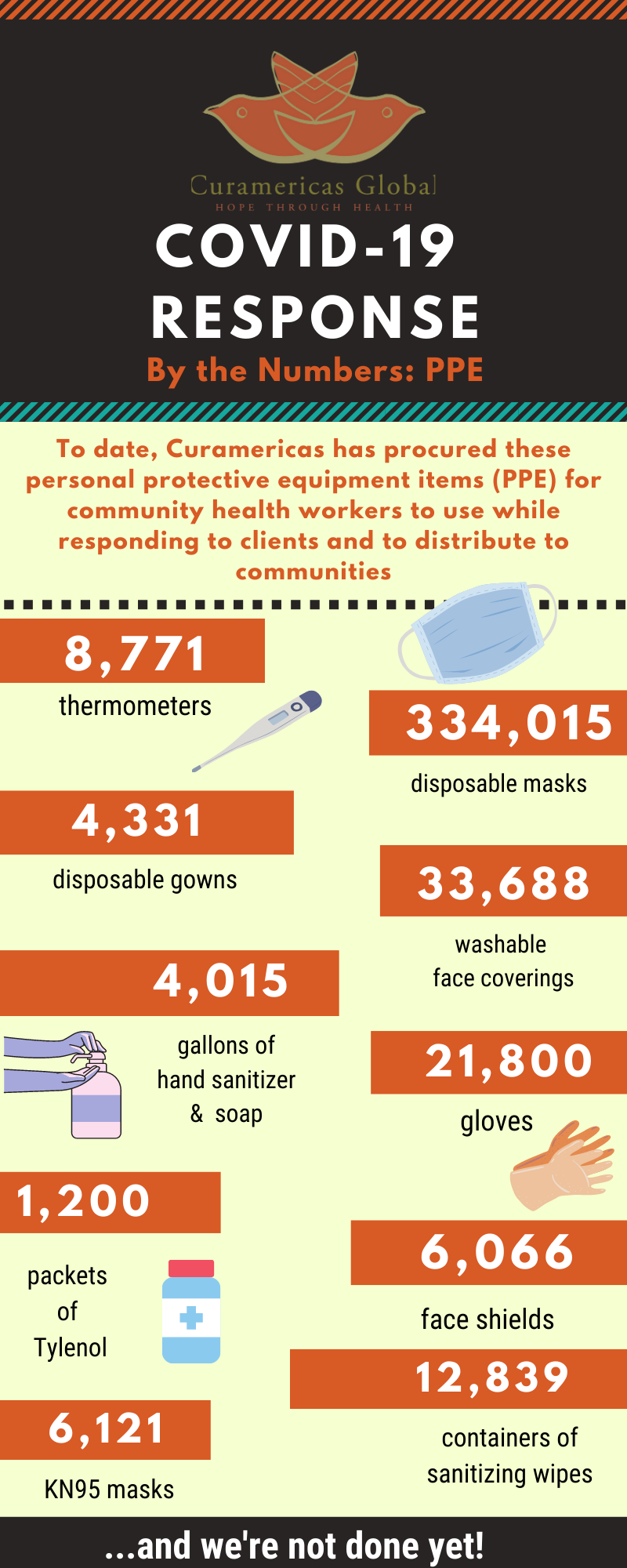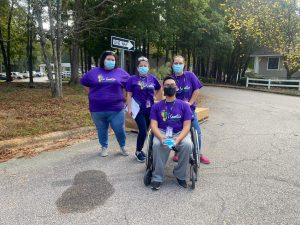COVID-19 Response
Curamericas Global is on the frontline of COVID-19 response in North Carolina.
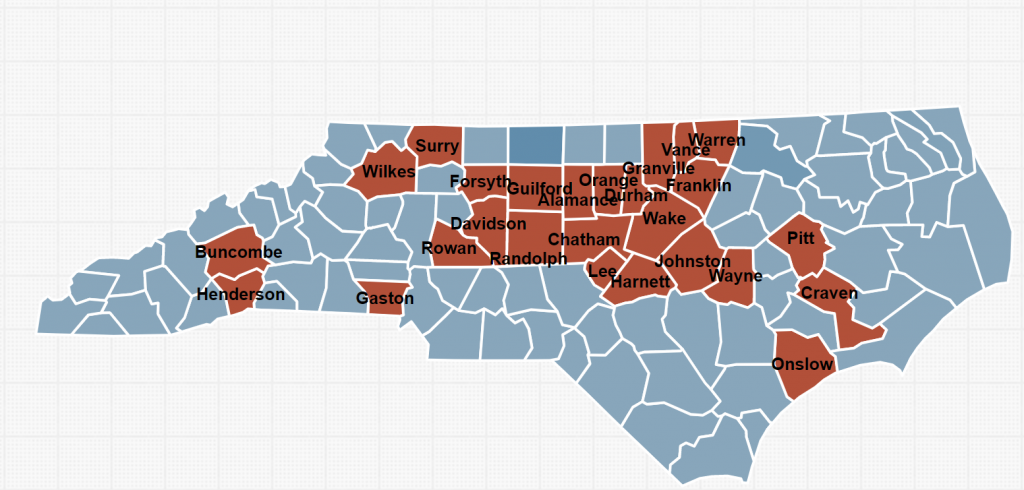 In early 2020, lives across the world were disrupted with the outbreak of a novel coronavirus now known as COVID-19. Many people immediately worried about their loved ones and family; at Curamericas, we also began thinking about our extended families. When the outbreak began, we had to balance the needs of our project sites abroad while strengthening our support systems at home. While the overseas communities we work with have largely avoided the worst aspects of the pandemic thanks to a combination of geographic isolation and quickly-deployed personal protection equipment (PPE) and COVID-19 information to our community health workers on the ground, many communities in North Carolina have been hit hard.
In early 2020, lives across the world were disrupted with the outbreak of a novel coronavirus now known as COVID-19. Many people immediately worried about their loved ones and family; at Curamericas, we also began thinking about our extended families. When the outbreak began, we had to balance the needs of our project sites abroad while strengthening our support systems at home. While the overseas communities we work with have largely avoided the worst aspects of the pandemic thanks to a combination of geographic isolation and quickly-deployed personal protection equipment (PPE) and COVID-19 information to our community health workers on the ground, many communities in North Carolina have been hit hard.
In March, our amazing volunteers began a coordinated and concerted effort to reach Spanish-speaking families across the Carolinas to advise them on protective measures against COVID-19 and offer emotional support. This initiative was made possible by our ongoing partnership with the Consulate of Guatemala in Raleigh.
As of August, Curamericas and more than 500 volunteers have reached over 10,000 Latinx families through a phone campaign and joined forces with the Pandemic Response Network (PRN) as a partner to serve the needs of individuals and communities during the pandemic, especially those that are hit hardest by COVID-19.
In August, Curamericas formed a partnership with the North Carolina Department of Health and Human Services (NCDHHS) and 19 community based organizations to enhance community health worker outreach in some of the most marginalized populations in North Carolina. Curamericas is now working across 26 counties to lead, train, and guide 190+ community health workers through community-based organizations focused on assisting Latinx and Black populations, who are disproportionately affected by the coronavirus. This partnership ended June 30, 2021.
Curamericas’ Executive Director, Andrew Herrera says, “This foundation of relationships and technology, combined with empowering community engagement, differentiate this project from other efforts to reach those most impacted by COVID-19. In addition to this short-term relief work, we are also focused on long-term capacity building of partners to better support communities. This is an important opportunity for our entire state to support frontline agencies and ensure they’re strong for years to come.”
We have reached nearly 80,000 people with education, PPE and COVID-19 related needs (as of December 2020). This program has also created 180 community health worker positions, each of whom is paid a living minimum wage of at least $20 an hour – a vital job creation program during a time when many people are being laid off or facing cut hours. They helped prevent eviction and place families in secure housing; connected patients with COVID-19 testing, health insurance, and primary care providers; supported COVID-19 positive clients isolating at home; kept families’ utilities turned on; and distributed thousands of boxes of healthy food and millions of hygiene and PPE items, among many other accomplishments. Above all, CHWs showed their communities that someone was looking out for them. At a time when people are feeling more isolated than ever before, the power of a CHW’s listening ear and comforting words cannot be understated.
Our work in North Carolina is ongoing, urgent, and emerging. now that a vaccine is becoming available, the work of Curamericas’ Community Health Workers is as important as ever – to bring evidence-based education to the public, to connect vulnerable populations to the services they need, and to track critical indicators Please support us by staying up-to-date with our work on social media or by newsletter, or support us with a donation. Learn more about volunteering with our efforts here.
Curamericas COVID-19 Response in the News:
- NCDHHS Selects Vendors to Supervise 250+ New Community Health Workers in 50 Counties with COVID-19 Hot Spots
- Public Health Student Learns the Power of a Phone Call
- Raleigh Nonprofit Helping Thousands of Spanish-Speaking Families during COVID-19 Pandemic
Videos:
- Hear from our partner GRRO https://fb.watch/1SEEY8QYxI/
- Our partner Gang Free Inc delivers “COVID Boxes” – Local Group Delivers Care Packages to Those with COVID-19 in Rural Areas
Learn more about the pandemic:
- Centers for Disease Control and Prevention (CDC) – Coronavirus (COVID-19)
- North Carolina Department of Health and Human Services – COVID-19 North Carolina Dashboard
- North Carolina Department of Health and Human Services – COVID-19 Information Hub
- The Lancet – Early estimates of the indirect effects of the COVID-19 pandemic on maternal and child mortality in low-income and middle-income countries: a modelling study
- The New England Journal of Medicine – Community Health Workers and Covid-19 — Addressing Social Determinants of Health in Times of Crisis and Beyond
- National Institutes of Health – NIH to assess and expand COVID-19 testing for underserved communities
- U.S. Department of Health and Human Services – HHS Coronavirus Updates
- Stokes EK, Zambrano LD, Anderson KN, et al. Coronavirus Disease 2019 Case Surveillance — United States, January 22–May 30, 2020. MMWR Morb Mortal Wkly Rep 2020;69:759–765. DOI: http://dx.doi.org/10.
15585/mmwr.mm6924e2external icon. - Killerby ME, Link-Gelles R, Haight SC, et al. Characteristics Associated with Hospitalization Among Patients with COVID-19 — Metropolitan Atlanta, Georgia, March–April 2020. MMWR Morb Mortal Wkly Rep. ePub: 17 June 2020. DOI: http://dx.doi.org/10.
15585/mmwr.mm6925e1external icon. - Gold JA, Wong KK, Szablewski CM, et al. Characteristics and Clinical Outcomes of Adult Patients Hospitalized with COVID-19 — Georgia, March 2020. MMWR Morb Mortal Wkly Rep 2020;69:545–550. DOI: http://dx.doi.org/10.
15585/mmwr.mm6918e1external icon.
- Price-Haygood EG, Burton J, Fort D, Seoane L. Hospitalization and Mortality among Black Patients and White Patients with Covid-19. N Engl J Med 2020. DOI: https://doi.org/10.1056/
nejmsa2011686external icon. - Millet GA, Jones AT, Benkeser D, et al. Assessing Differential Impacts of COVID-19 on Black Communities. Ann Epidemiol. 2020;47:37-44. DOI: https://doi.org/10.1016/
j.annepidem.2020.05.003externa l icon. - The Kaiser COVID tracking dashboard: https://www.kff.
org/other/state-indicator/ covid-19-cases-by-race- ethnicity/?currentTimeframe=0& sortModel=%7B%22colId%22:% 22Location%22,%22sort%22:% 22asc%22%7D
Stories of Success
Through our COVID-19 response, we’ve been fortunate to work with an amazing group of nonprofits across the state. Community health workers at these nonprofits assist the public in finding the services they need to quarantine, heal, and bounce back. It’s hard work, and we rejoice in the success stories they share with us.
